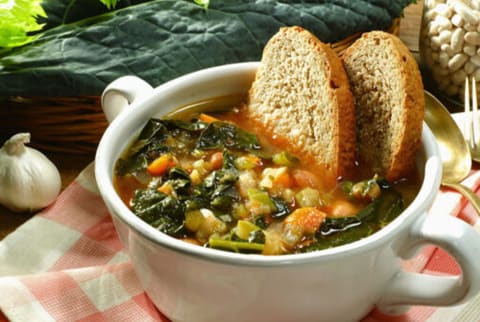Advertisement
Ribollita Soup Is A Classic Tuscan Comfort Made From Pantry Staples


Italians consider stale bread a preferred ingredient for many popular recipes. The word stale does not conjure up negative connotations in Italy. Rather, cooking with stale bread prevents waste. It is often a better choice in dishes that call for firm, hard bread.
When stale bread is toasted, then added to broth, it maintains its shape and absorbs all the flavors, becoming an invaluable addition. Tuscan Women Cook shares a delicious fall soup recipe featuring stale bread that is a favorite of the nonnas of the Tuscan village of Montefollonico as well as the participants of Tuscan Women Cook.
Like most Tuscan fare, Ribollita dates to the Middle Ages when peasants foraged for whatever food they could find. They crafted a thick, satisfying soup from dried beans, common vegetables from backyard gardens, and stale bread.
“Our first bowl of this hearty soup was prepared by the beautiful, ninety-year-young nonna, Iolanda Marcocci,” says Coleen Kirnan, host, and owner of Tuscan Women Cook. “Iolanda served it al fresco on the terrace outside her kitchen on a long, weathered table overlooking a sweeping Tuscan sunset. It is a rich sense memory we’ll always cherish.”
As the weather cools down, warm up with a bowl of this Italian favorite soup.
Ribollita
Ribollita means “re-boiled” in Italian; another way of saying, “wow, this will taste even better tomorrow!” When the bread has an extra day or two to absorb even more of the flavorful broth, Ribollita will thicken and taste creamy. Feel free to add your favorite vegetables and herbs to this recipe. There are no hard and fast rules for Ribollita, except to reheat and enjoy, day after day.
Servings: 8
Ingredients
- 2 cups (14 ounces) dried small white beans, washed
- small piece of Parmesan cheese rind
- ½ cup extra-virgin olive oil
- 1 large yellow onion, diced
- 4 large carrots, peeled and diced
- 3 celery ribs, diced
- 1 28-ounce can whole peeled tomatoes, undrained
- Sea salt
- Freshly ground black pepper
- Dried oregano
- 3 large Swiss chard leaves, chiffonade
- ½ medium white cabbage, chopped
- 8 pieces dry day old or toasted Italian bread
- Parmesan cheese for garnish
- Olive oil for garnish
Instructions
- Rinse the beans in a colander and pick out any debris or small stones. Place in a medium stockpot and add cold water to cover the beans by about 2 inches. Cover and soak overnight
- Drain the beans and cover then with fresh water. Add the Parmesan cheese rind. Over medium heat, simmer until the beans are tender, about 30 minutes. Set aside.
- Heat the olive oil in a large Dutch oven over medium heat. Add the diced onion, carrots, and celery (soffritto). Cook, stirring occasionally until the onions are translucent, for about 10 minutes.
- Stir in the tomatoes, the beans, and their cooking liquid. Season with salt, pepper, and oregano. Add the chard and cabbage. Add additional water, chicken or vegetable stock as needed to completely cover the chard and cabbage.
- Bring the mixture to boil. Reduce the heat and simmer for 1 hour. Adjust the seasonings to taste.
- Place a piece of bread in each bowl. Ladle the soup on top of the bread. Top each serving of the soup with some Parmesan cheese, a dash of olive oil, and freshly ground black pepper.
Recipe and photo reprinted with permission of www.TuscanWomenCook.com from the Tuscan Women Cook Cookbook